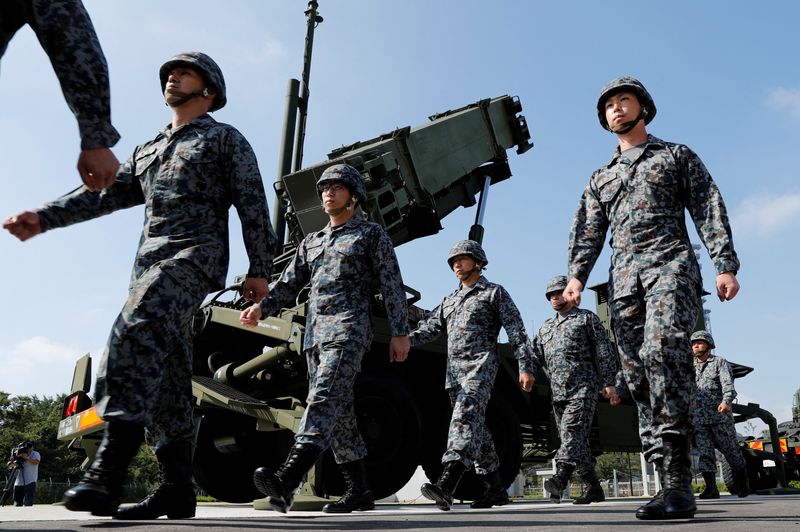By Nobuhiro Kubo and Tim Kelly
TOKYO (Reuters) -A U.S. plan to use Japanese factories to boost production of Patriot air defence missiles - used by Ukraine to defend against Russian attacks - is being delayed by a shortage of a critical component manufactured by Boeing (NYSE:BA), four sources said.
Japan's Mitsubishi Heavy Industries (MHI) already makes about 30 PAC-3 missiles each year under licence from defence contractor Lockheed Martin (NYSE:LMT) and can increase that number to about 60, two Japanese government officials and two industry sources told Reuters.
The U.S. hopes to increase production from about 500 a year to more than 750 per year globally as soon as possible, a person familiar with the program said. But no expansion at all will be possible in Japan without additional supplies of the missiles' seekers, which guide them in the final stages of flight, the officials and industry sources said.
"It could take several years before MHI is able to raise output" because of the shortage, said one of the industry sources, who like the others declined to be identified because they are not authorised to speak to the media.
The production snag in Japan shows the challenges Washington faces in plugging industrial help from its global allies into its complex supply chains.
Boeing last year began expanding its seeker factory in the United States to increase production by 30%, although the additional lines won't operate until 2027. The company did not say last year how many were produced, but noted it had just delivered its 5,000th.
A Boeing representative referred questions to Lockheed Martin, the prime contractor for the interceptor.
Lockheed Martin has said it is increasing its U.S. output of Patriot interceptors from 500 to 650 by 2027. Each costs about $4 million.
Even if enough seekers are available, expanding annual PAC-3 production in Japan beyond 60 would require MHI to build more capacity.
In its 2022 plan to double military spending, Japan's government said it would offer financial help to defence companies that wanted to expand production. Those subsidies, however, only apply to equipment destined for the country's Self Defense Forces and not exports.
That means that MHI or the United States would have to stump up the money to pay for a new PAC-3 factory, which could cost tens of millions of dollars or more, one of the Japanese government sources said.
"The Indo-Pacific is a large area of focus for the U.S. and our allies and strategically postured capabilities in the region are critical to support deterrence and maintain readiness," Lockheed Martin said in an email, referring questions about PAC-3 production in Japan to the Japanese and U.S. governments, and MHI.
Japan's Ministry of Defense declined to comment. MHI declined to comment.
A U.S. defence official said a $4.5 billion contract signed in June with the U.S. Army - the Patriot system's primary customer - marked the beginning of a ramp-up in production of both missiles and seekers.
Foreign and defence ministers from Japan and the United States are set to meet in Tokyo this month for talks that are expected to include deepening industrial cooperation on defence. The Patriot project is seen as a key part of that effort.
Even with help from allies, supply chain bottlenecks complicate U.S. efforts to supply Ukraine's demand for munitions, including air defence systems that can thwart Russian attacks.
In the deadliest wave of air strikes in months, a Russian missile in July struck a children's hospital, killing at least 41 civilians.
In December 2023, Japan eased military export rules to allow it to help replenish U.S. Patriot missile stocks, which had been tapped to help Ukraine.
U.S. Ambassador to Japan Rahm Emanuel, who called that a "historic decision", has been a leading proponent of deeper military industrial ties with Japan that could ease the strain on U.S. defence contractors.

U.S. President Joe Biden and Japanese Prime Minister Fumio Kishida agreed in April to deepen defence industry cooperation.
In an opinion piece published by the Wall Street Journal two months after that meeting, Emanuel described a shrunken U.S. military industrial complex as a "weak link" that had been exposed by the Ukraine war and the Middle East conflict.